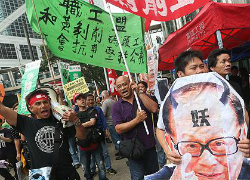
(HuffPo)
Dockworkers in Hong Kong have been on strike since March 28, protesting salaries that have remained stagnant since 2003 while the cost of living in the densely populated city has increased exponentially. In addition to unlivable wages, the striking employees have drawn international attention to their arduously long shifts, which they are forced to work without bathroom or meal breaks.
The workers, represented by the Hong Kong Dockworkers Union, are demanding a 15-20 percent pay increase and more humane working conditions. So far, their employers have declined to offer anything higher than a seven percent raise, and government negotiators are working with both sides to reach a solution. Although local laws offer little protection for the striking workers, international pressure by organized labor is forcing employers at the dock to take the workers’ demands seriously.
Employees originally struck at the port, and they continue to picket there, joined by local activist groups and international labor organizations expressing support for and solidarity with their plight. However, Hong Kong executive Li Ka-shing, Asia’s richest man and the executive who ultimately controls the various shippers for whom the strikers work, has become the strikers’ primary target. Li Ka-shing’s company, Hutchinson Whampoa, runs dock operations at the Hong Kong International Terminal and other docks throughout the world.
While the strike focuses on issues unique to the Hong Kong employees, it has attracted the attention and support of organized labor around the world, especially at those ports also operated by Hutchinson. An international campaign team organized in London by the International Transport Workers Federation is running a global funding appeal and is considering organizing solidarity strikes around the world at other ports owned by Hutchinson. Shortly after the strike began, the Maritime Union of Australia, part of the ITWF, sent a delegation to stand by the Hong Kong strikers. The Australian delegation aims to fortify the strikers with global attention and support as they continue to negotiate with the port for higher wages and better working conditions.
Even as much of the international labor community rallies behind the striking workers, Chinese news outlets are questioning the utility of labor organizations in Hong Kong’s unique economic setting. Many Hong Kong employers also operate in nearby Shenzhen, China, where unions play “more or less a symbolic role.” As the strike nears the beginning of its second month, and economic losses amount to more than $500,000 per day, it is difficult to imagine this union retreating to a merely symbolic role any time in the near future.
The international response to the dockworkers’ strike is a compelling example of the power that international labor organizations have to influence the conditions of fellow laborers around the world. The inability of Li Ka-shing and other executives, even with the assistance of government mediators, to disband the strike after a full month of protests demonstrates that even a leading financial superpower like Hong Kong cannot exploit workers as a matter of course without facing repercussions. The international spotlight, accompanied by international solidarity fundraising, will remain on the port until a just resolution is reached.
Whitney Denning is a staff editor for the Denver Journal of International Law & Policy. She is a 2L, earning a certificate in Workplace Law.


